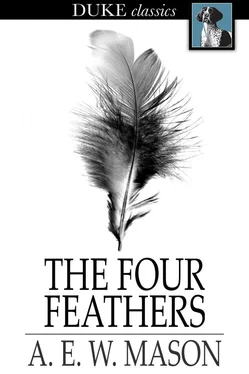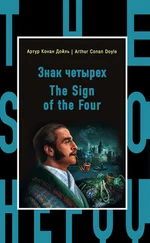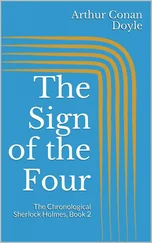A. Mason - The Four Feathers
Здесь есть возможность читать онлайн «A. Mason - The Four Feathers» весь текст электронной книги совершенно бесплатно (целиком полную версию без сокращений). В некоторых случаях можно слушать аудио, скачать через торрент в формате fb2 и присутствует краткое содержание. Жанр: Исторические приключения, на английском языке. Описание произведения, (предисловие) а так же отзывы посетителей доступны на портале библиотеки ЛибКат.
- Название:The Four Feathers
- Автор:
- Жанр:
- Год:неизвестен
- ISBN:нет данных
- Рейтинг книги:5 / 5. Голосов: 1
-
Избранное:Добавить в избранное
- Отзывы:
-
Ваша оценка:
- 100
- 1
- 2
- 3
- 4
- 5
The Four Feathers: краткое содержание, описание и аннотация
Предлагаем к чтению аннотацию, описание, краткое содержание или предисловие (зависит от того, что написал сам автор книги «The Four Feathers»). Если вы не нашли необходимую информацию о книге — напишите в комментариях, мы постараемся отыскать её.
The Four Feathers — читать онлайн бесплатно полную книгу (весь текст) целиком
Ниже представлен текст книги, разбитый по страницам. Система сохранения места последней прочитанной страницы, позволяет с удобством читать онлайн бесплатно книгу «The Four Feathers», без необходимости каждый раз заново искать на чём Вы остановились. Поставьте закладку, и сможете в любой момент перейти на страницу, на которой закончили чтение.
Интервал:
Закладка:
"Among the storehouses," said Trench. They dived into the first alley which they passed, and turning a corner saw the man who had brought the matches.
"I am Abdul Kader," he began at once. "I have come to arrange for your escape. But at present flight is impossible;" and Trench swayed upon his feet as he heard the word.
"Impossible?" asked Feversham.
"Yes. I brought three camels to Omdurman, of which two have died. The Effendi at Suakin gave me money, but not enough. I could not arrange for relays, but if you will give me a letter to the Effendi telling him to give me two hundred pounds, then I will have everything ready and come again within three months."
Trench turned his back so that his companion might not see his face. All his spirit had gone from him at this last stroke of fortune. The truth was clear to him, appallingly clear. Abdul Kader was not going to risk his life; he would be the shuttle going backwards and forwards between Omdurman and Suakin as long as Feversham cared to write letters and Sutch to pay money. But the shuttle would do no weaving.
"I have nothing with which to write," said Feversham, and Abdul Kader produced them.
"Be quick," he said. "Write quickly, lest we be discovered." And Feversham wrote; but though he wrote as Abdul suggested, the futility of his writing was as clear to him as to Trench.
"There is the letter," he said, and he handed it to Abdul, and, taking Trench by the arm, walked without another word away.
They passed out of the alley and came again to the great mud wall. It was sunset. To their left the river gleamed with changing lights-here it ran the colour of an olive, there rose pink, and here again a brilliant green; above their heads the stars were coming out, in the east it was already dusk; and behind them in the town, drums were beginning to beat with their barbaric monotone. Both men walked with their chins sunk upon their breasts, their eyes upon the ground. They had come to the end of hope, they were possessed with a lethargy of despair. Feversham thought not at all of the pine trees on the Surrey hills, nor did Trench have any dread that something in his head would snap and that which made him man be reft from him. They walked slowly, as though their fetters had grown ten times their weight, and without a word. So stricken, indeed, were they that an Arab turned and kept pace beside them, and neither noticed his presence. In a few moments the Arab spoke: "The camels are ready in the desert, ten miles to the west."
But he spoke in so low a voice, and those to whom he spoke were so absorbed in misery, that the words passed unheard. He repeated them, and Feversham looked up. Quite slowly their meaning broke in on Feversham's mind; quite slowly he recognised the man who uttered them.
"Abou Fatma!" he said.
"Hoosh!" returned Abou Fatma, "the camels are ready."
"Now?"
"Now."
Trench leaned against the wall with his eyes closed, and the face of a sick man. It seemed that he would swoon, and Feversham took him by the arm.
"Is it true?" Trench asked faintly; and before Feversham could answer Abou Fatma went on: "Walk forwards very slowly. Before you reach the end of the wall it will be dusk. Draw your cloaks over your heads, wrap these rags about your chains, so that they do not rattle. Then turn and come back, go close to the water beyond the storehouses. I will be there with a man to remove your chains. But keep your faces well covered and do not stop. He will think you slaves."
With that he passed some rags to them, holding his hands behind his back, while they stood close to him. Then he turned and hurried back. Very slowly Feversham and Trench walked forwards in the direction of the prison; the dusk crept across the river, mounted the long slope of sand, enveloped them. They sat down and quickly wrapped the rags about their chains and secured them there. From the west the colours of the sunset had altogether faded, the darkness gathered quickly about them. They turned and walked back along the road they had come. The drums were more numerous now, and above the wall there rose a glare of light. By the time they had reached the water's edge opposite the storehouses it was dark. Abou Fatma was already waiting with his blacksmith. The chains were knocked off without a word spoken.
"Come," said Abou. "There will be no moon to-night. How long before they discover you are gone?"
"Who knows? Perhaps already Idris has missed us. Perhaps he will not till morning. There are many prisoners."
They ran up the slope of sand, between the quarters of the tribes, across the narrow width of the city, through the cemetery. On the far side of the cemetery stood a disused house; a man rose up in the doorway as they approached, and went in.
"Wait here," said Abou Fatma, and he too went into the house. In a moment both men came back, and each one led a camel and made it kneel.
"Mount," said Abou Fatma. "Bring its head round and hold it as you mount."
"I know the trick," said Trench.
Feversham climbed up behind him, the two Arabs mounted the second camel.
"Ten miles to the west," said Abou Fatma, and he struck the camel on the flanks.
Behind them the glare of the lights dwindled, the tapping of the drums diminished.
Chapter XXX — The Last of the Southern Cross
The wind blew keen and cold from the north. The camels, freshened by it, trotted out at their fastest pace.
"Quicker," said Trench, between his teeth. "Already Idris may have missed us."
"Even if he has," replied Feversham, "it will take time to get men together for a pursuit, and those men must fetch their camels, and already it is dark."
But although he spoke hopefully, he turned his head again and again towards the glare of light above Omdurman. He could no longer hear the tapping of the drums, that was some consolation. But he was in a country of silence, where men could journey swiftly and yet make no noise. There would be no sound of galloping horses to warn him that pursuit was at his heels. Even at that moment the Ansar soldiers might be riding within thirty paces of them, and Feversham strained his eyes backwards into the darkness and expected the glimmer of a white turban. Trench, however, never turned his head. He rode with his teeth set, looking forwards. Yet fear was no less strong in him than in Feversham. Indeed, it was stronger, for he did not look back towards Omdurman because he did not dare; and though his eyes were fixed directly in front of him, the things which he really saw were the long narrow streets of the town behind him, the dotted fires at the corners of the streets, and men running hither and thither among the houses, making their quick search for the two prisoners escaped from the House of Stone.
Once his attention was diverted by a word from Feversham, and he answered without turning his head: "What is it?"
"I no longer see the fires of Omdurman."
"The golden blot, eh, very low down?" Trench answered in an abstracted voice. Feversham did not ask him to explain what his allusion meant, nor could Trench have disclosed why he had spoken it; the words had come back to him suddenly with a feeling that it was somehow appropriate that the vision which was the last thing to meet Feversham's eyes as he set out upon his mission he should see again now that that mission was accomplished. They spoke no more until two figures rose out of the darkness in front of them, at the very feet of their camels, and Abou Fatma cried in a low voice: "Instanna!"
They halted their camels and made them kneel.
"The new camels are here?" asked Abou Fatma, and two of the men disappeared for a few minutes and brought four camels up. Meanwhile the saddles were unfastened and removed from the camels Trench and his companion had ridden out of Omdurman.
Читать дальшеИнтервал:
Закладка:
Похожие книги на «The Four Feathers»
Представляем Вашему вниманию похожие книги на «The Four Feathers» списком для выбора. Мы отобрали схожую по названию и смыслу литературу в надежде предоставить читателям больше вариантов отыскать новые, интересные, ещё непрочитанные произведения.
Обсуждение, отзывы о книге «The Four Feathers» и просто собственные мнения читателей. Оставьте ваши комментарии, напишите, что Вы думаете о произведении, его смысле или главных героях. Укажите что конкретно понравилось, а что нет, и почему Вы так считаете.











